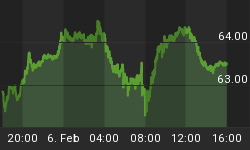Hallelujah, of course, is a word of praise. To use that word to describe the fact that the USD has lost 40% of its value in the last 5 years, however, is economic blasphemy. Yet last week on television I had the pleasure of debating a well known strategist on the fallout of our crumbling currency and his angelic chorus was heard praising the falling dollar because of his belief that it would boost exports, rescue the economy from recession and encourage future GDP growth. Truly, "Hallelujah for the falling dollar!" is exactly what he exclaimed.
How this type of popcorn economics is allowed to permeate the airwaves is beyond me, but we have all endured this kind of rhetoric long enough that it is time to draw a line in the sand to protect our currency. His contention, along with many others, further underscores my belief that if continue on our current monetary course, we will be doomed to further a further, banana republic-style loss of purchasing power. With this sort of thinking today, It should come as no surprise to the U.S. consumer that the price of oil is now approaching $120/barrel and that most commodities are at or near record highs. There can be no mystery as to why inflation is at a multi-decade high.
Let's be clear: a falling dollar makes all Americans poorer. It not only forces our import dependent economy to experience higher prices, it causes domestic prices to rise as well. But the most pernicious part of our chronically weak currency will come in the near future because it will discourage foreign investment into our economy just when we need it the most. In prior commentaries I have stressed how our future debt obligations will cause tremendous strain on our economic growth, and it is becoming more widely known that our projected entitlement deficits are expected to reach $59 trillion. With no domestic savings, our hopes of prosperity lie in the lap of continued foreign largess.
The trouble with that plan is that foreign central banks already own 53% of our publicly-traded debt. Compounding the problem is that 64% of their currency reserves are already held in U.S. dollars. Having a non-diversified and concentrated currency reserve is an untenable position -- how are these foreign creditors supposed to increase their U.S. dollar weightings from here?
By the way, if you think that foreign central banks have no choice but to support our treasury market, listen to a quote made on March 27th 2008 from Kwang Dae-hwan, head of South Korea's Pension fund (the fifth largest pension fund in the world). "It is difficult to buy more US Treasuries because the portion of our Treasury Investment is already too big and Treasury yields have fallen a lot."
I would hasten to add to Mr. Dae-hwan's comments that the value of his Treasuries has crumbled in currency-adjusted terms. The above quote received little attention, especially from those who believe that un-ending deficits are our birthright but just how long can these foreign creditors be expected to support our Treasury market, struggling currency and reckless spending habits regardless of how it affects their economy?
It would seem prudent to me that the U.S. should do everything in its power now to strengthen the currency and boost domestic savings, especially in light of the amount of Treasury issuance which will be needed in the near future as Medicare and Social Security really come home to roost.
Hallelujahs aside, it is without question a horrible tradeoff to suffer runaway inflation and a stagnant economy in the simplistic name of boosting exports -- especially in view of the fact that manufacturing today represents little over 10% of U.S. Gross Domestic Product.
Unfortunately, it appears the chorus in praise of currency debasement is growing louder even as the dollar continues to sink. If Wall St. and Washington, D.C. continue to worship at the feet of crumbling currency, it won't be long until their Hallelujahs fall silent against the crashing wave of hyperinflation.
*I discuss this silly yearning for a weak dollar this week on my podcast, The Mid-Week Reality Check!















